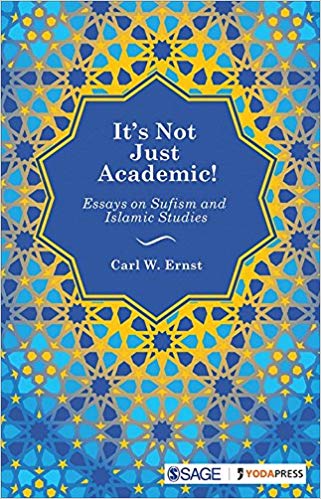It’s Not Just Academic!: Essays on Sufism and Islamic Studies is a collection of Carl W Ernst’s previously published work on basic and critical issues relating to the study of Islam, with the purpose of presenting this material in a manner that is accessible to the reading public, and not just specialists. There is a conviction throughout Ernst’s work that scholarship in the humanities matters, and that it is important to communicate its conclusions clearly to the reading public. For this, Ernst proposes a method of ‘stealth analysis’ in which a reader is presented with an argument and accompanying evidence that enables them to understand the critical issues and consequences that are at stake, by summarizing the main concerns and debates without resorting to opaque and inscrutable language. Academics are required to present a subject fully enough so it can achieve what Ernst calls ‘dismediation’, displacing the media images with clear and compelling dialogue, while respecting and empowering the reader rather than dictating a conclusion. This volume is therefore not only a contribution to the field of Islamic Studies, but also attempts to critique the current style of academic discourse. The volume contains twenty-eight chapters, which are divided into five broad rubrics, arranged in a loose chronological and thematic manner. Ernst studies Islam not only as a religion, but as a historical, literary, and cultural movement which took various forms over time. A short introduction foregrounds why these histories are important, as well as their contemporary significance, and describes how scholarship in the field of Islamic Studies has evolved by connecting institutional and disciplinary developments to controversies in the 1970s, the Gulf War in the 1990s, and the terrorist attacks in America in the new millennium.
The first part, ‘General and Critical Issues on Islamic Studies’, deals with questions of how to teach Islamic Studies in the present political climate, how to categorize Sufism, strategies for reading the Qur’an, the role of the Prophet as a spiritual guide, and the cultural significance of the Arabic language. In the academy today, there is a fair degree of ambiguity attached to the concept of Sufism, as with other terms coined during the Enlightenment to describe religions that have now become standard. Ernst suggests using it as a descriptive term of the ‘family resemblance’ variety, to cover all the external social and historical manifestations associated with Sufi orders, saints, and the interior practice of Islam, while endeavouring to point out the gap between insider and outsider perspectives. He attempts to grapple with the uncomfortable questions that might arise when engaging with Islam, either as a religion, a political entity, or a literary movement, and tries to delineate and trace the historical genealogies of the categories we use.

